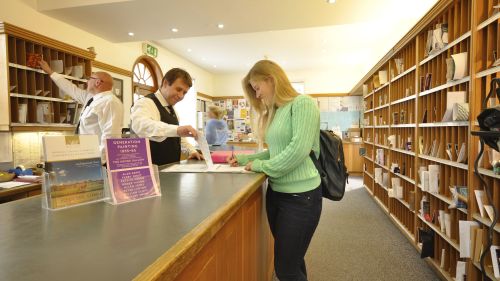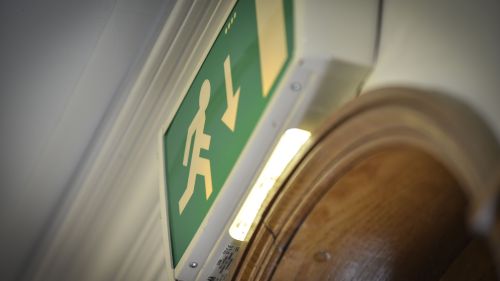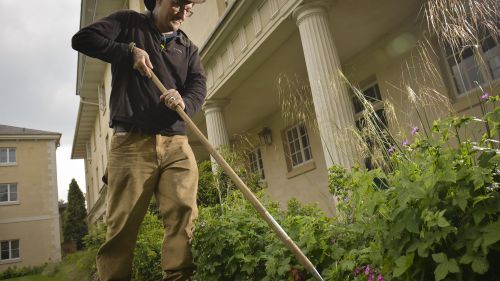
Safety and security
The safety of its students is the highest priority of Downing College. Here you’ll find information on safety procedures and guidelines to reduce the risk of accidents.
Security
The College has installed security locks on the doors of most staircases and all houses to provide a greater degree of security for rooms and those who occupy them. It is very important that staircase doors should be kept closed and locked.
There is a comprehensive security policy in operation which requires those enquiring about any student at the Porters’ Lodge to produce identification and sign a visitors’ book. Members of the College should inform their guests of this procedure.
No information about junior members is given out over the telephone. The Porters’ Lodge is able to take steps, both short and long-term, to provide extra security measures for individuals, should they feel them to be necessary.
Any student who is worried about security should liaise with their Tutor, the Head Porter or the JCR Welfare Officer.
In an emergency, operating the fire alarm on a staircase or in a College house will summon assistance very quickly.
There are a number of personal attack alarms provided for members of the College to borrow from the Porters’ Lodge. They may be borrowed overnight on deposit of your University Card.
Alarms may also be purchased or borrowed from the JCR Women’s Welfare and Equal Opportunities Officer.
Personal safety
Students should take the normal precautions associated with living in a relatively big city.
Moving around in town at night:
- try to travel in pairs or groups
- keep to main routes where other people are around
- dress ‘down’ rather than ‘up’
- use public transport or taxis late at night
- avoid deserted or ill-lit areas, especially ‘green areas’ (such as Parkers Piece)
- avoid arguments with strangers
- consider carrying a personal alarm
- look confident and do not stare at strangers
- consider carrying a mobile phone but keep it out of sight
- do not leave belongings unattended or within reach of strangers
- keep all valuable items such as jewellery on your person out of sight of others
- do not carry large sums in cash
- keep in a separate place details of valuable items, credit card numbers, and serial numbers.
Where you live:
- insure your property
- never leave your room with the door unlocked
- close and fasten windows when you are not in
- take great care of your keys
- do not let people in who you do not know.
For further information and advice please refer to the following:
- Cambridgeshire Police's StudySafe web site
- the Suzy Lamplugh leaflet on keeping safe as a student
- the Downing College stay safe on a night out video
- Register all of your property via the National Property Register at Immobilse.com.
Security plan (bomb and incendiary device procedures)
There are three phases to consider with regard to Security alerts in the College:
- initial prevention
- reaction to a general alert
- reaction to a specific threat.
Initial prevention
This is a general responsibility for all members of the College: staff, Fellows and students.
Access to the Domus is generally controlled by means of the Porters and common lock gates, backed up by staff vigilance and CCTV monitoring. Staircases and houses are required to be closed and locked; there should not be any opportunity for anyone to leave devices in those areas.
Each person is responsible for their individual room. Unknown persons should be questioned as to their presence inside buildings. Rubbish is regularly cleared away so that devices cannot be hidden.
Any rubbish bins (waste paper/skips etc.) are located away from inhabited buildings, and regularly emptied and inspected by housekeeping staff.
In general, the message to the whole College community is for everybody to keep their eyes open and their wits about them.
General alert
This is a non-specific threat towards the area (Cambridge) or the establishment (the University), such as by animal rights activists.
Such threat advice is rapidly disseminated to all concerned by the Head Porter and her staff, and then each area is responsible for its own security sweep and reporting back to the Porters’ Lodge when complete.
Public areas will be checked by Housekeeping staff. Hostelkeepers and resident fellows are responsible for their own house and environs, and each individual should check their own room(s), including adjoining corridor areas.
The aim is to split the work up among many people to reduce the overall time taken, to improve reaction time and to heighten awareness.
Reaction to a specific threat
In this situation, we would have had information that the College or a particular staircase or building has been targeted.
The aim is always to avoid the risk of death or injury, so such a specific threat would warrant immediate evacuation of the building or area concerned, followed by a full sweep by bomb disposal experts.
The quickest way to effect this evacuation will be by sounding the fire alarm for the area concerned. Explosive Ordnance Device reporting will be via the Porters (or the incident controller) to the local police station.
Students are prohibited from keeping fireworks, firearms (actual or imitation), swords or other offensive weapons in their room.
CCTV
CCTV cameras are used on the Domus to help to safeguard the security of people and property.
Cameras, which are capable of being directed and zoomed remotely, are positioned to capture views of the car parking areas, the main entrance and strategic areas, as well as general views across the Domus. The live pictures are viewed, from time to time, by the College’s Porters in order to detect any suspicious activity.
Warning signs are in place at the Regent Street entrance to inform staff, students, Fellows and members of the public that surveillance cameras are in operation.
CCTV footage is retained for 30 days and stored in a secure location. It is then wiped clean if not required as evidence.
Information derived from CCTV surveillance will only be used for security purposes, unless it leads to the discovery of an activity that no employer could reasonably be expected to ignore, for example, breaches of Health and Safety rules that put others at risk.
You have the right of access to information about yourself held on CCTV footage. To request access you will be asked to:
- complete a Data Access Request Form which is available from the Records Manager
- pay the current fee
- provide evidence of your identity.


